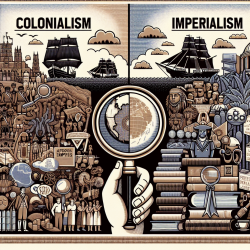Understanding the Distinction: Colonialism vs. Imperialism
In the realm of political theory, the terms "colonialism" and "imperialism" are often used interchangeably, yet they hold distinct meanings and implications. A recent article titled "Colonialism versus Imperialism" by Barbara Arneil provides a comprehensive analysis of these differences, tracing their historical and ideological roots. As practitioners in the field of education and therapy, understanding these distinctions can offer valuable insights into the development of more effective and culturally sensitive practices.
Key Distinctions
Arneil identifies that colonialism and imperialism, although overlapping, have distinct ideological underpinnings. Colonialism is rooted in the Latin term "colonia," which refers to agrarian settlements. It is characterized by the principles of segregation, agrarian labor, and the "improvement" of both people and land. This ideology was often justified through the lens of "improving" so-called "backward" peoples and lands through labor and education.
Imperialism, on the other hand, originates from the Latin "imperare," meaning to dominate. It involves the domination of foreign lands and peoples, often justified through conquest and later through the language of civilization and development. This form of power is typically exercised from afar, with the imperial metropole asserting control over vast territories.
Implications for Practitioners
Understanding these distinctions is crucial for practitioners, especially those involved in educational and therapeutic services. Recognizing the historical and ideological contexts of colonialism and imperialism can help practitioners develop more culturally sensitive approaches. Here are some ways to apply these insights:
- Cultural Sensitivity: Recognize the historical impacts of colonialism and imperialism on different communities. This awareness can guide the development of culturally sensitive educational materials and therapeutic approaches.
- Empowerment: Focus on empowering communities by respecting and integrating their cultural practices and knowledge into educational and therapeutic settings.
- Critical Reflection: Encourage critical reflection on historical narratives and their impact on current educational and therapeutic practices. This can lead to more inclusive and equitable outcomes for children.
Encouraging Further Research
The article by Arneil provides a foundation for understanding the distinctions between colonialism and imperialism. Practitioners are encouraged to delve deeper into these topics to enhance their understanding and improve their practice. Engaging with this research can lead to more informed and effective interventions that respect and incorporate diverse cultural perspectives.
To read the original research paper, please follow this link: Colonialism versus Imperialism.










